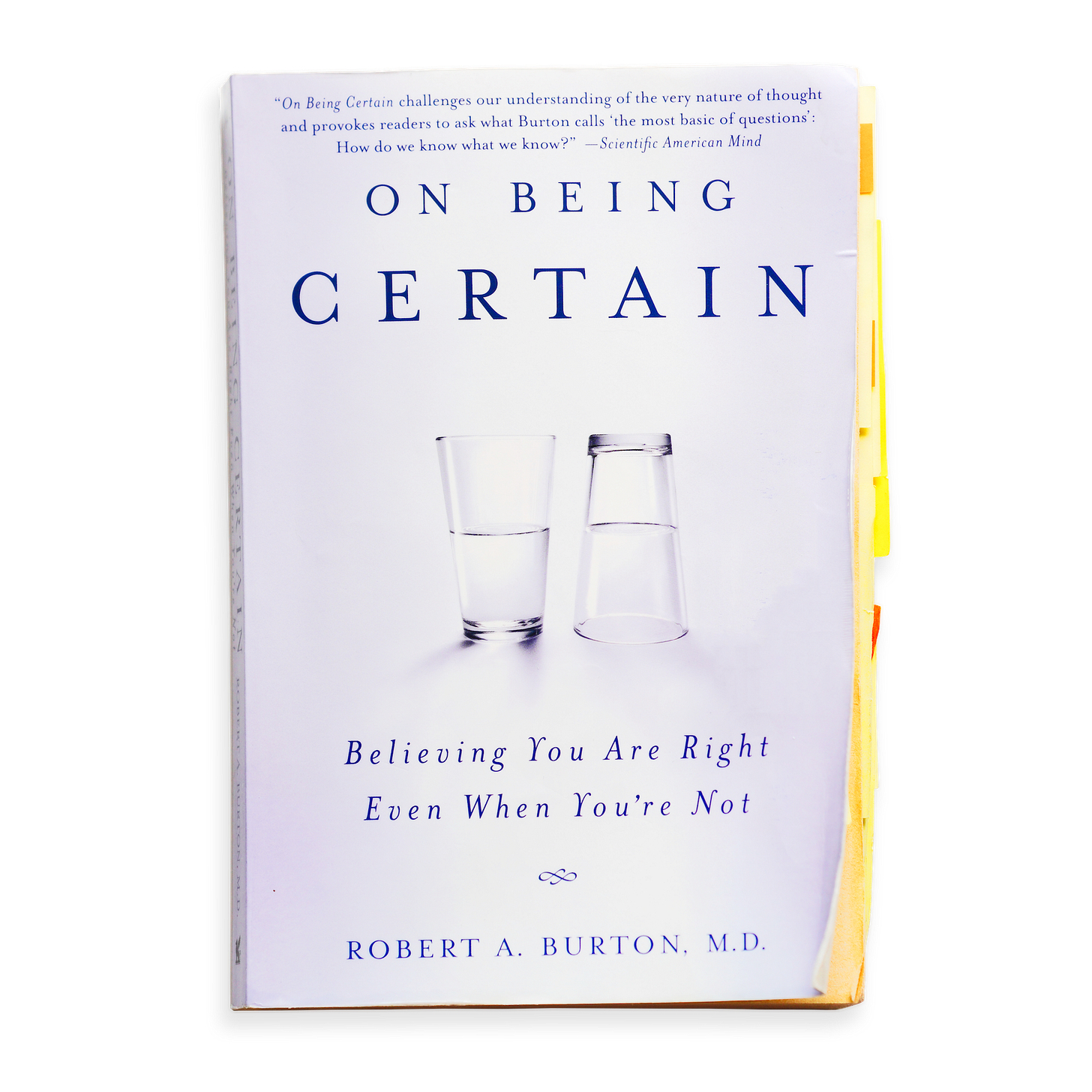"On Being Certain" by Robert A. Burton, MD | Neuroscience | 95% Book Score
"...if we continue to enable this relationship between ‘feeling’ and knowledge, what does it say about how we validate and verify any actual truthfulness?"
Author: Robert A. Burton, MD
Published: 2008
Published back in 2008, On Being Certain is arguably more relevant today than when it first hit bookshelves 15 years ago. Robert Burton forces us to scrutinize our understanding of knowledge; in how we experience knowledge, and how a key neurophysiological sensation, he calls a “Feeling of Knowing”, subconsciously drives and shapes our core understanding of that knowledge.
In ruthlessly neuroscientific fashion, we're walked through several studies that expose our natural tendency towards fooling ourselves; potentially caused either by how our brains are wired (or unwired) or simply by the consuming strength of that Feeling of Knowing. One study asked 106 participants to write down their memories of how they experienced the space shuttle Challenger disaster. After 2.5 years, when asked to write down these same memories again (followed by a reveal of their original entries), a whopping 90% of participants had incorrect recollections, with 25% posing "strikingly different" accounts. One participant passionately remarked, "that's my handwriting but that's not what happened!".
“That’s my handwriting but that’s not what happened!”
These mental “inconsistencies” are highlighted by Burton’s phrase "Feeling of Knowing" since, as a big fan of William James1, he knows that any language surrounding what we consider to be knowledge strongly anchors our core perceptions of it. As an example, we commonly speak to knowledge as though it can be "felt" when, in reality, we can't actually feel our thoughts at all - we think them. And, as a society, if we continue to associate this relationship between ‘feeling’ and knowledge (subconsciously or not), what does it say about how we validate or verify the actual truthfulness of that knowledge?
As humans, we make this association to feeling a truth because it's impossible to think our thoughts when they're initially formed subconsciously. Our sense of conviction and validation, which in some cases manifests itself as a spiritual incident of enlightenment, is processed and analyzed within the regions of the brain related to our subconscious fight-or-flight responses. If you come from a software background, this is much like the lexical analysis that happens at compile time - when we convert (parse) our code into smaller units (tokens), we can then assign meaning to those tokens relative to the program. As an example, what we see with our eyes (sensory input data), is first parsed by our retina fibres and either sent to the part of the brain for seeing (if the visual cortex is working in the first place) or to the areas of the brain concerned with automatic / reflexive functions (relating to fight-or-flight again). As a result, when patients with damaged visual cortexes experience what's called the "blindsight" phenomenon, they're able to accurately pin-point the location of a light being shone on a particular area of their retina, despite their believing that any answer they give is just a wild guess!
Though repeatedly reading such brutal "truths" related to our mental perceptions felt, at times, a bit depressing... I think this is one of the smartest books I've ever read; and not because he breaks down systems (like neural networks) with incredible clarity (which he does)... but because Burton has a clear passion and thinks critically where it counts - from acknowledging an industry peer's groundbreaking use of gene manipulation in rats over traditionally surgical procedures; to his critiques of mainstream ideas like those from Malcom Gladwell’s book “Blink” - warning us that an interpretation of subconscious thought as instinct is potentially dangerous since it overlooks our subconscious biases (which tend to be reinforced by, you guessed it, that Feeling of Knowing).
“If modern neuroscience indicates, the self is an ongoing personal narrative constructed by the very mind that is examining itself, introspection is analogous to interpreting a complex work of fiction.”
If you're dabbling in artificial intelligence, are often finding yourself in political discussions, or you're just trying to get a better understanding of your brain’s limitations, I urge you to give this book a shot! It's a very critical read during a very critical time of false certainties. At least that much I can be certain of.
Ria
“Pragmatism” by William James > “Lecture VI: Pragmatism’s Perception of Truth” > Paragraph 12



This is something I absolutely look forward to read. Thanks for the review.